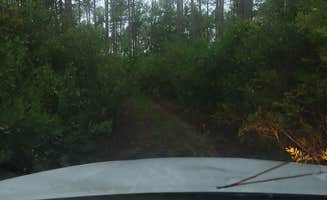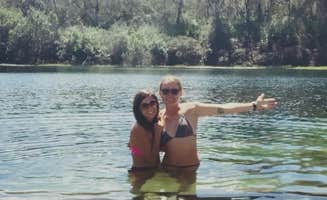Dispersed camping areas near Holder, Florida predominantly concentrate in the Ocala National Forest, where primitive sites offer little to no facilities for rustic camping experiences. The forest maintains several off-grid camping locations throughout its 387,000 acres of pine scrub, sand pine, and longleaf pine ecosystems. Summer temperatures regularly exceed 90°F, making spring and fall the preferred seasons for backcountry camping adventures.
What to do
Fishing opportunities: Trout Lake Primitive Sites provides access to freshwater fishing. One camper noted, "It's a beautiful lake and forest. The setting is breathtaking." Access requires navigating through narrow forest roads with limited clearance.
Photography excursions: Lake Dorr offers scenic views despite access challenges. Visitors should plan morning photography sessions when wildlife is most active and lighting conditions are optimal for nature photography.
Forest exploration: At Blue Sink, visitors can explore the unique karst topography. The area features a natural depression where groundwater emerges, creating a striking blue-green pool. Getting there requires some effort as "You may need ATV or creative backpacking to get there now."
What campers like
Solitude and privacy: Trout Lake Primitive Sites offers "a set of primitive spots near lake" where campers appreciate the isolation. Reviewers mention "poor cell service even with booster," making it ideal for those seeking digital disconnection.
Natural water features: Campers repeatedly mention the striking natural water features as highlights. One visitor described Blue Sink as the "Most beautiful place to stumble upon," highlighting its pristine condition.
Night sky viewing: The minimal light pollution in primitive camping areas creates excellent stargazing conditions. Campers report clear night skies when weather permits, particularly during winter months when humidity is lower.
What you should know
Vehicle requirements: Access to most primitive sites requires appropriate vehicles. For Trout Lake Primitive Sites, "4WD recommended. Just barely scraped a FWD Promaster through the trees, into a pullout just before sand started."
Access road conditions: Many sites have deteriorating or intentionally limited access. At Blue Sink, "The Forestry Service recently chopped down trees and covered the easy access roads."
Safety considerations: Some areas have reported safety issues. At Lake Dorr, a visitor warned they "left because it felt unsafe" after speaking with locals who mentioned concerns about the area.
Wildlife awareness: Black bear sightings occur in the forest. One camper at Trout Lake reported, "I had a black bear sighting that afternoon and I had no bear spray no cellphone service." Proper food storage is essential.
Tips for camping with families
Emergency preparedness: When camping with children, bring essential safety gear. A camper at Trout Lake noted being "scared to death all night alone" without cell service or bear spray, underscoring the importance of preparation.
Weather contingencies: Plan for Florida's unpredictable weather patterns. A visitor at Lake Dorr reported difficult conditions after rain, noting "Got stuck in sand on the way out and had to wait for a tow truck."
Site selection: Choose sites with easier access when camping with young children. Look for established clearings with minimal undergrowth and avoid areas with recent tree work or road blockages.
Timing considerations: Plan family camping trips during cooler months (November-March) when insects are less prevalent and temperatures more moderate for children.
Tips from RVers
Size restrictions: Large RVs face significant challenges at these rustic camping spots near Holder, Florida. At Trout Lake, access roads have "very narrow tree clearance" that makes navigating difficult for anything beyond small campervans.
Surface challenges: Sandy conditions can trap vehicles, especially after rain. One camper at Lake Mary Tent Camping advised avoiding driving through sandy sections without four-wheel drive, particularly when pulling trailers.
Alternative hookup options: For those requiring hookups, consider established campgrounds outside the national forest instead of these primitive sites, as none offer water, electric or sewer connections.



